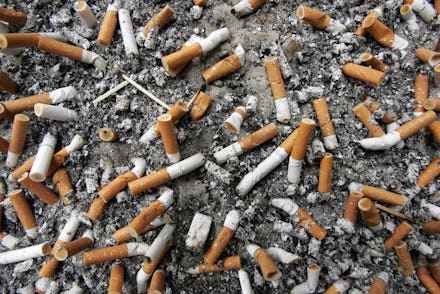Cigarette butts may be the greatest source of ocean pollution, a new report says

If you’ve hopped on the anti-straw bandwagon, well, there’s another cause for you to endorse.
Worldwide, 4.5 trillion cigarettes are thrown away every year. According to the Truth Initiative, in 2016 alone, 1,030,630 cigarette butts were collected from U.S. beaches and waterways, making up nearly a quarter of all garbage found in our oceans. Cigarette butts have been known to be toxic to fish, dogs and children, even when consumed in small quantities.
And when cigarettes make their way to our waterways, it’s a whole other story. On Monday, a report by NBC News named cigarette butts the single greatest source of ocean pollution — above the much-maligned plastic straws. According to a report by the Ocean Conservancy, cigarette butts are the most common item collected on beaches, while plastic straws and stirrers rank seventh on the list.
Cigarette butts, also known as filters, are made of cellulose acetate, a type of plastic that never biodegrades. They serve no purpose other than psychological manipulation, since they’re used as a marketing tool to give the impression of a healthier cigarette, according to Thomas Novotny, CEO of the Cigarette Butt Pollution Project. “It’s pretty significant fraud. The word ‘filter’ means that it’s actually taking something out of the smoke that’s being inhaled,” Novotny said over the phone. “But there’s no evidence of that. In fact, a type of lung cancer that’s far more aggressive is probably the result of that filter.”
In 2017, San Francisco introduced a number of pilot programs aimed at curbing cigarette butt pollution, including installing cigarette butt ashcans in its streets. In tested areas, cigarette butt pollution decreased by 52% on average.
In February, California Assembly Member Mark Stone re-introduced legislation that would ban cigarette butts in the state to help preserve California’s waterways. “When I first introduced this measure in 2014, tobacco companies claimed that existing anti-litter laws and industry-funded awareness programs were sufficiently addressing cigarette butt waste dangers and costs. That’s a lie,” Stone said in a statement. “There’s a simple solution to all these problems: it’s time to ban the butts.”
To curb the problem, Novotny recommends properly disposing of cigarette butts in the trash or using public ash trays. But public ash trays aren’t necessarily a long-term solution, either, he said. “People tend not to use them. Ash trays have been tried, but they have to be emptied some place and I’ve actually seen them emptied into sewers.”
Phillip Morris International, one of the largest American-owned tobacco companies and parent company of Marlboro, says consumers ultimately must make the change.
“We support anti-littering awareness campaigns and the proper disposal of cigarette butts,” Corey Henry, manager of U.S. media relations and engagement at PMI, told Mic in an email. “We believe that the best way to reduce littering, and cigarette butt littering in particular, is to encourage proper disposal of consumer waste and drive consumer behavior change.”
Novotny believes it’ll take an effort from both consumers and big tobacco companies for true change to happen, however.
“Like so many things in public health, it’s a combination of things. In California, there’s the PaintCare act. if you have unused paint, there’s a program that’s funded by the paint industry that will support paint being brought back to be recycled or destroyed, with costs absorbed by the industry and passed onto consumers,” he said. “This can be applied to tobacco — and raising a level of attention is important.”